Ward A.W. The Cambridge History of British Foreign Policy. 1783-1919. Volume 3
Подождите немного. Документ загружается.

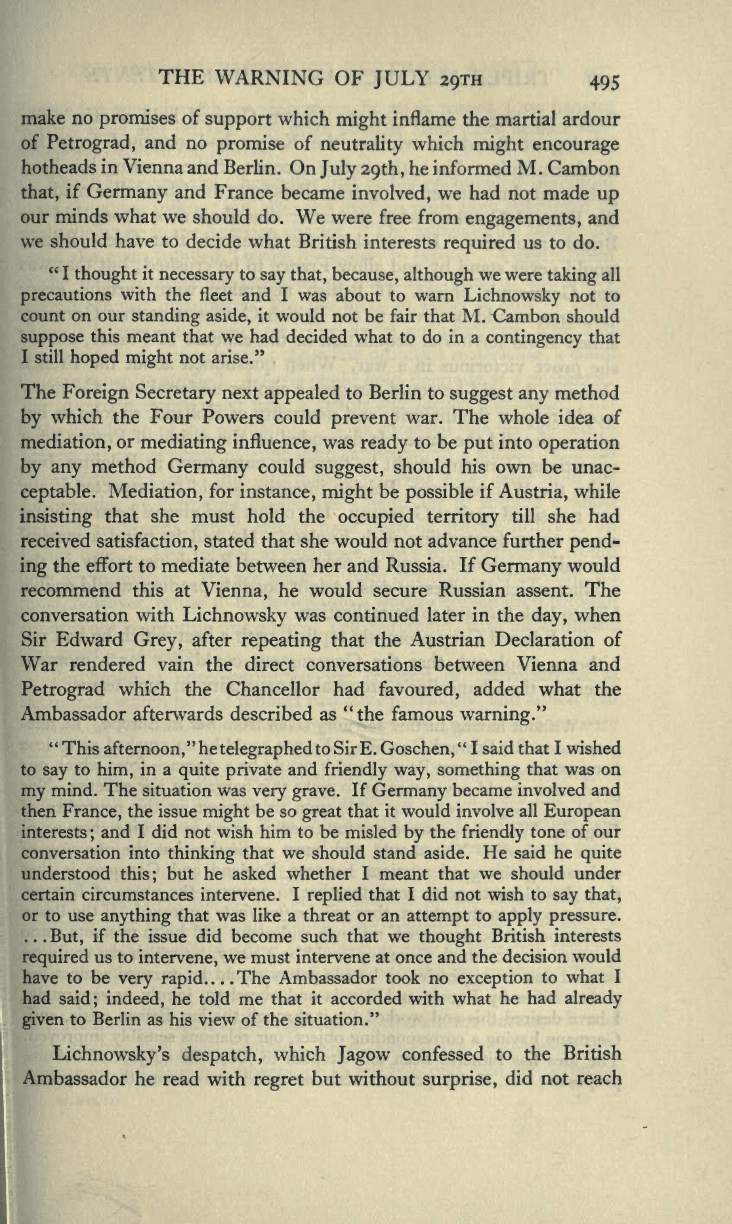
THE
WARNING
OF
JULY
29TH 495
make
no
promises
of
support
which
might
inflame
the
martial
ardour
of
Petrograd,
and
no
promise
of
neutrality
which
might
encourage
hotheads
in
Vienna
and
Berlin. On
July
29th,
he informed
M.
Cambon
that,
if
Germany
and
France
became
involved,
we
had
not
made
up
our
minds
what we
should
do. We
were
free
from
engagements,
and
we
should
have to
decide
what British
interests
required
us
to
do.
"I
thought
it
necessary
to
say
that,
because,
although
we were
taking
all
precautions
with
the
fleet
and
I
was about to warn
Lichnowsky
not
to
count
on
our
standing
aside,
it
would not
be
fair
that M. Cambon
should
suppose
this
meant
that we had
decided what to
do in
a
contingency
that
I
still
hoped
might
not
arise."
The
Foreign
Secretary
next
appealed
to Berlin to
suggest any
method
by
which
the Four
Powers could
prevent
war. The whole idea
of
mediation,
or
mediating
influence,
was
ready
to be
put
into
operation
by
any
method
Germany
could
suggest,
should his own be unac-
ceptable.
Mediation,
for
instance,
might
be
possible
if
Austria,
while
insisting
that she
must
hold
the
occupied territory
till
she
had
received
satisfaction,
stated
that
she
would not
advance further
pend-
ing
the effort to
mediate between
her and Russia.
If
Germany
would
recommend this at
Vienna,
he would
secure
Russian assent. The
conversation with
Lichnowsky
was
continued later
in
the
day,
when
Sir Edward
Grey,
after
repeating
that the Austrian
Declaration
of
War rendered
vain
the
direct
conversations between
Vienna
and
Petrograd
which
the Chancellor had
favoured,
added
what the
Ambassador
afterwards
described as
"the famous
warning."
"This
afternoon,"
he
telegraphed
to
Sir
E.Goschen,"
I
said that
I
wished
to
say
to
him,
in a
quite
private
and
friendly way, something
that was on
my
mind. The situation
was
very
grave.
If
Germany
became involved
and
then
France,
the
issue
might
be so
great
that it would involve
all
European
interests;
and I
did not wish
him
to be misled
by
the
friendly
tone
of our
conversation into
thinking
that we should stand aside. He
said he
quite
understood
this;
but he asked whether
I
meant
that we should
under
certain
circumstances intervene.
I
replied
that I
did
not
wish to
say
that,
or
to use
anything
that was like
a threat or an
attempt
to
apply
pressure.
. .
.
But,
if
the issue did
become
such that we
thought
British
interests
required
us
to
intervene,
we must
intervene at once
and
the
decision
would
have to be
very
rapid
The
Ambassador took no
exception
to
what I
had
said;
indeed,
he told
me
that
it
accorded with
what he
had
already
given
to Berlin
as
his view of the
situation."
Lichnowsky's
despatch,
which
Jagow
confessed to
the
British
Ambassador he read
with
regret
but without
surprise,
did not reach
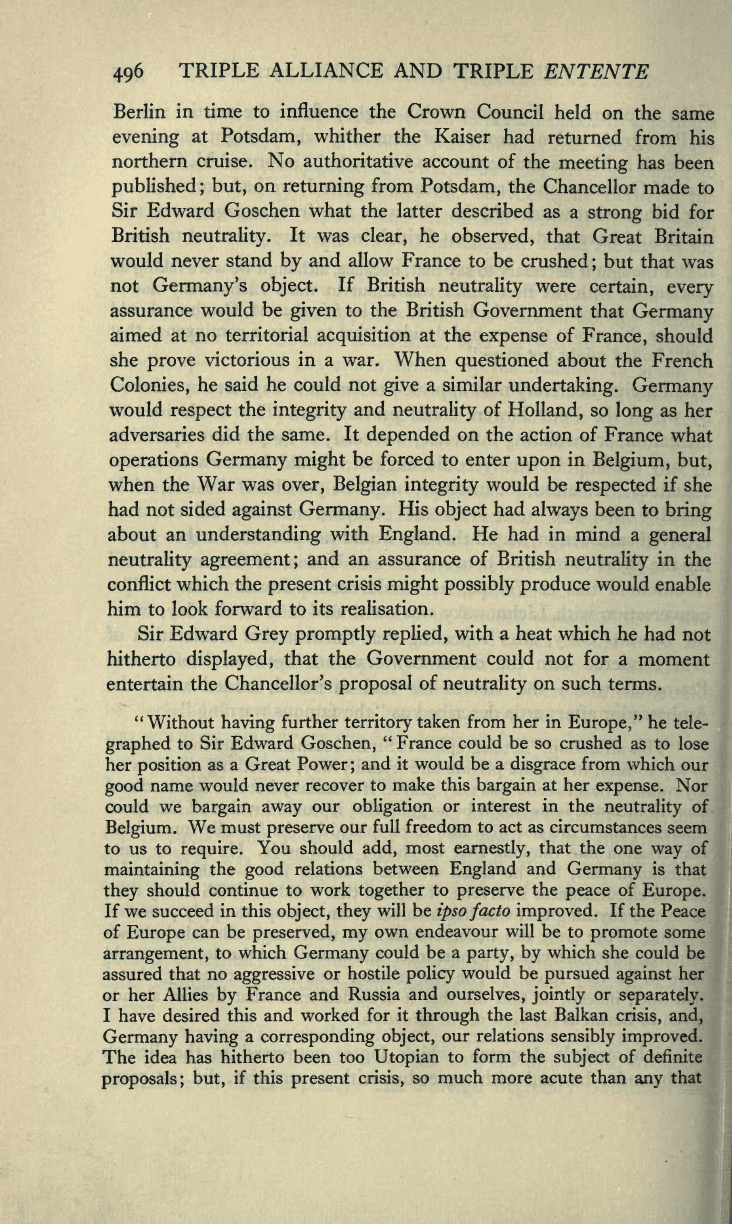
496
TRIPLE
ALLIANCE AND
TRIPLE
ENTENTE
Berlin
in
time
to
influence the Crown
Council
held on
the
same
evening
at
Potsdam,
whither
the
Kaiser
had
returned
from
his
northern
cruise.
No
authoritative
account of
the
meeting
has
been
published
; but,
on
returning
from
Potsdam,
the
Chancellor
made to
Sir
Edward
Goschen
what the
latter
described as
a
strong
bid
for
British
neutrality.
It was
clear,
he
observed,
that
Great
Britain
would
never stand
by
and allow
France
to be
crushed
;
but that was
not
Germany's object.
If
British
neutrality
were
certain,
every
assurance
would
be
given
to the
British
Government
that
Germany
aimed at
no territorial
acquisition
at the
expense
of
France,
should
she
prove
victorious
in a war. When
questioned
about the
French
Colonies,
he
said he could not
give
a
similar
undertaking.
Germany
would
respect
the
integrity
and
neutrality
of
Holland,
so
long
as
her
adversaries
did
the
same. It
depended
on
the action of
France
what
operations
Germany might
be forced
to
enter
upon
in
Belgium,
but,
when
the
War was
over,
Belgian integrity
would
be
respected
if
she
had not
sided
against Germany.
His
object
had
always
been to
bring
about
an
understanding
with
England.
He
had in
mind
a
general
neutrality
agreement;
and
an
assurance of
British
neutrality
in
the
conflict
which the
present
crisis
might
possibly
produce
would
enable
him to
look forward to its
realisation.
Sir Edward
Grey
promptly
replied,
with
a
heat which
he had
not
hitherto
displayed,
that the Government
could
not
for
a
moment
entertain
the
Chancellor's
proposal
of
neutrality
on
such terms.
"Without
having
further
territory
taken from her in
Europe,"
he
tele-
graphed
to
Sir
Edward
Goschen,
"
France could be so
crushed as
to
lose
her
position
as
a
Great
Power
;
and it
would
be
a
disgrace
from
which
our
good
name
would never recover
to make
this
bargain
at her
expense.
Nor
could
we
bargain
away
our
obligation
or
interest
in
the
neutrality
of
Belgium.
We
must
preserve
our full freedom
to act as
circumstances
seem
to us to
require.
You should
add,
most
earnestly,
that
the
one
way
of
maintaining
the
good
relations
between
England
and
Germany
is
that
they
should
continue
to work
together
to
preserve
the
peace
of
Europe.
If we succeed
in this
object,
they
will be
ipso facto
improved.
If
the
Peace
of
Europe
can
be
preserved,
my
own endeavour
will
be
to
promote
some
arrangement,
to
which
Germany
could
be a
party,
by
which
she could be
assured that
no
aggressive
or hostile
policy
would
be
pursued
against
her
or her
Allies
by
France and
Russia and
ourselves,
jointly
or
separately.
I
have desired
this
and
worked
for it
through
the last Balkan
crisis, and,
Germany
having
a
corresponding
object,
our
relations
sensibly improved.
The
idea
has hitherto been
too
Utopian
to
form
the
subject
of
definite
proposals;
but,
if this
present
crisis,
so much
more acute
than
any
that
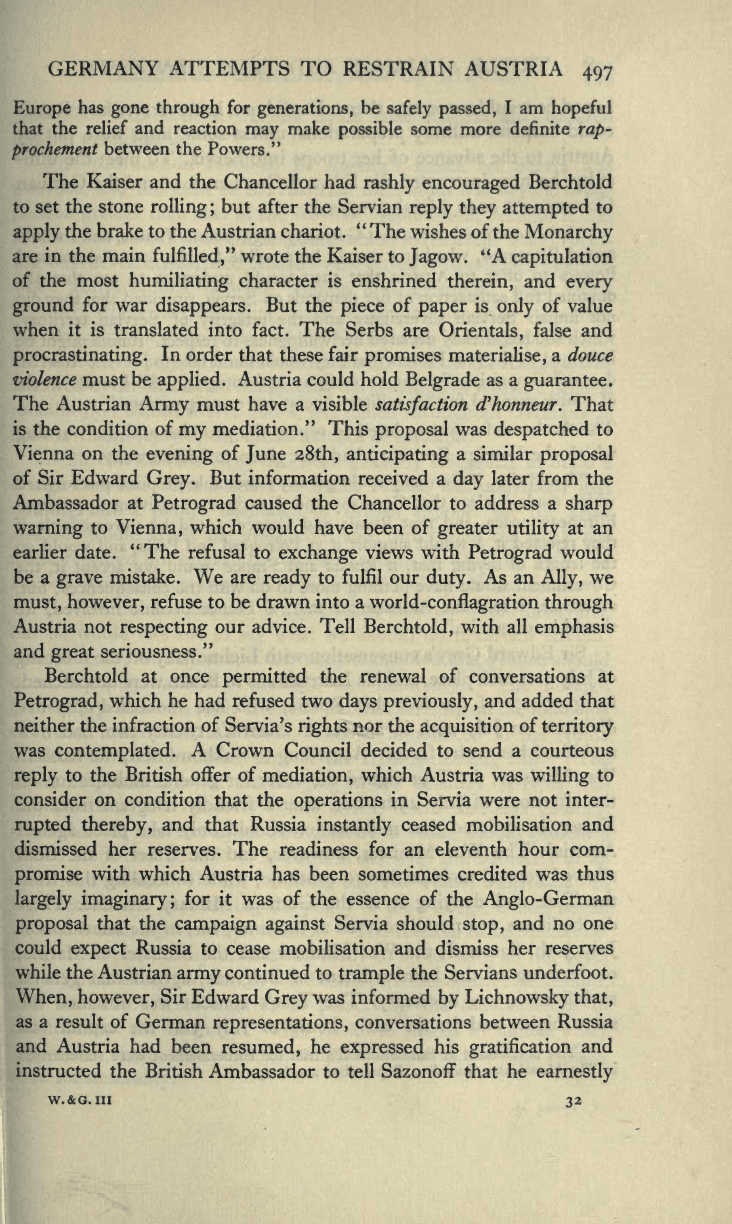
GERMANY ATTEMPTS TO
RESTRAIN AUSTRIA
497
Europe
has
gone through
for
generations,
be
safely
passed,
I am
hopeful
that the relief
and
reaction
may
make
possible
some
more definite
rap-
prochement
between
the Powers."
The Kaiser and the
Chancellor had
rashly encouraged
Berchtold
to
set the stone
rolling
;
but after
the
Servian
reply they
attempted
to
apply
the
brake
to the
Austrian chariot.
"
The wishes of
the
Monarchy
are
in
the main
fulfilled,
"
wrote the Kaiser to
Jagow.
"A
capitulation
of the most
humiliating
character
is
enshrined
therein,
and
every
ground
for war
disappears.
But the
piece
of
paper
is
only
of value
when it
is
translated
into fact. The Serbs are
Orientals,
false
and
procrastinating.
In
order
that these
fair
promises
materialise,
a douce
violence
must
be
applied.
Austria
could hold
Belgrade
as a
guarantee.
The Austrian
Army
must have
a
visible
satisfaction
d'honneur.
That
is
the condition
of
my
mediation." This
proposal
was
despatched
to
Vienna on the
evening
of
June
28th,
anticipating
a similar
proposal
of
Sir Edward
Grey.
But
information received a
day
later
from the
Ambassador
at
Petrograd
caused
the
Chancellor
to address
a
sharp
warning
to
Vienna,
which
would have been of
greater utility
at
an
earlier date.
"The
refusal to
exchange
views
with
Petrograd
would
be a
grave
mistake. We are
ready
to fulfil our
duty.
As an
Ally,
we
must, however,
refuse to be drawn
into
a
world-conflagration
through
Austria not
respecting
our advice.
Tell
Berchtold,
with
all
emphasis
and
great
seriousness."
Berchtold at
once
permitted
the renewal of
conversations
at
Petrograd,
which he had
refused two
days previously,
and
added that
neither
the infraction
of
Servia's
rights
nor
the
acquisition
of
territory
was
contemplated.
A
Crown
Council
decided
to
send a courteous
reply
to the
British offer
of
mediation,
which
Austria was
willing
to
consider
on
condition
that
the
operations
in
Servia were not
inter-
rupted
thereby,
and
that
Russia
instantly
ceased mobilisation
and
dismissed her reserves. The
readiness
for an
eleventh
hour com-
promise
with which
Austria
has been
sometimes credited
was thus
largely imaginary;
for
it
was of
the essence
of
the
Anglo-German
proposal
that the
campaign
against
Servia should
stop,
and no one
could
expect
Russia to cease mobilisation and dismiss her
reserves
while
the Austrian
army
continued to
trample
the
Servians
underfoot.
When, however,
Sir
Edward
Grey
was
informed
by
Lichnowsky
that,
as a
result
of
German
representations,
conversations
between
Russia
and
Austria
had
been
resumed,
he
expressed
his
gratification
and
instructed
the
British Ambassador to tell
Sazonoff
that
he
earnestly
w.&g. in
32
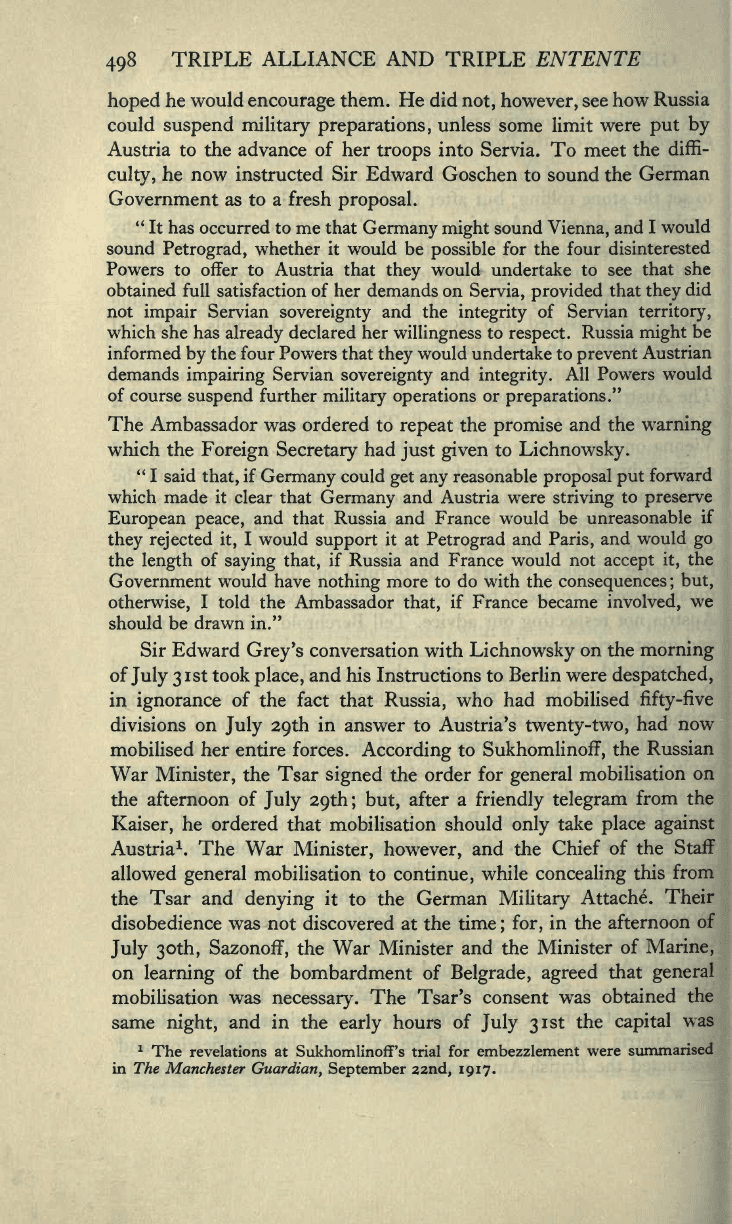
498
TRIPLE
ALLIANCE AND
TRIPLE
ENTENTE
hoped
he
would
encourage
them.
He
did
not, however,
see
how
Russia
could
suspend
military
preparations,
unless
some
limit
were
put
by
Austria to the advance
of
her
troops
into Servia. To meet
the
diffi-
culty,
he now
instructed
Sir
Edward
Goschen to sound the
German
Government
as
to
a
fresh
proposal.
"
It has
occurred
to
me that
Germany
might
sound
Vienna,
and
I would
sound
Petrograd,
whether
it
would be
possible
for the four
disinterested
Powers to
offer
to Austria that
they
would
undertake
to see
that
she
obtained
full satisfaction
of
her demands on
Servia,
provided
that
they
did
not
impair
Servian
sovereignty
and the
integrity
of Servian
territory,
which
she has
already
declared her
willingness
to
respect.
Russia
might
be
informed
by
the four
Powers
that
they
would
undertake
to
prevent
Austrian
demands
impairing
Servian
sovereignty
and
integrity.
All
Powers
would
of course
suspend
further
military operations
or
preparations."
The
Ambassador was
ordered to
repeat
the
promise
and the
warning
which
the
Foreign
Secretary
had
just
given
to
Lichnowsky.
"
I said
that,
if
Germany
could
get
any
reasonable
proposal
put
forward
which
made
it
clear that
Germany
and
Austria were
striving
to
preserve
European peace,
and that Russia and France would
be unreasonable
if
they rejected
it,
I
would
support
it at
Petrograd
and
Paris,
and
would
go
the
length
of
saying
that,
if
Russia
and
France
would
not
accept
it,
the
Government
would
have
nothing
more to
do with the
consequences;
but,
otherwise,
I told
the Ambassador
that,
if France became
involved,
we
should
be drawn
in."
Sir Edward
Grey's
conversation
with
Lichnowsky
on the
morning
of
July
31st
took
place,
and his
Instructions
to Berlin
were
despatched,
in
ignorance
of
the fact that
Russia,
who
had mobilised
fifty-five
divisions
on
July 29th
in
answer
to
Austria's
twenty-two,
had
now
mobilised her
entire
forces.
According
to
Sukhomlinoff,
the
Russian
War
Minister,
the
Tsar
signed
the
order
for
general
mobilisation
on
the afternoon
of
July 29th
;
but,
after
a
friendly
telegram
from the
Kaiser,
he ordered
that mobilisation should
only
take
place
against
Austria
1
.
The
War
Minister, however,
and
the
Chief
of the
Staff
allowed
general
mobilisation to
continue,
while
concealing
this
from
the
Tsar
and
denying
it to the German
Military
Attache.
Their
disobedience
was
not discovered at the time
;
for,
in
the
afternoon
of
July
30th,
Sazonoff,
the
War
Minister
and the
Minister
of
Marine,
on
learning
of
the
bombardment
of
Belgrade,
agreed
that
general
mobilisation
was
necessary.
The
Tsar's consent
was
obtained
the
same
night,
and in
the
early
hours
of
July 31st
the
capital
was
1
The
revelations
at
Sukhomlinoff's trial
for embezzlement
were summarised
in
The Manchester
Guardian,
September
22nd, 19 17.
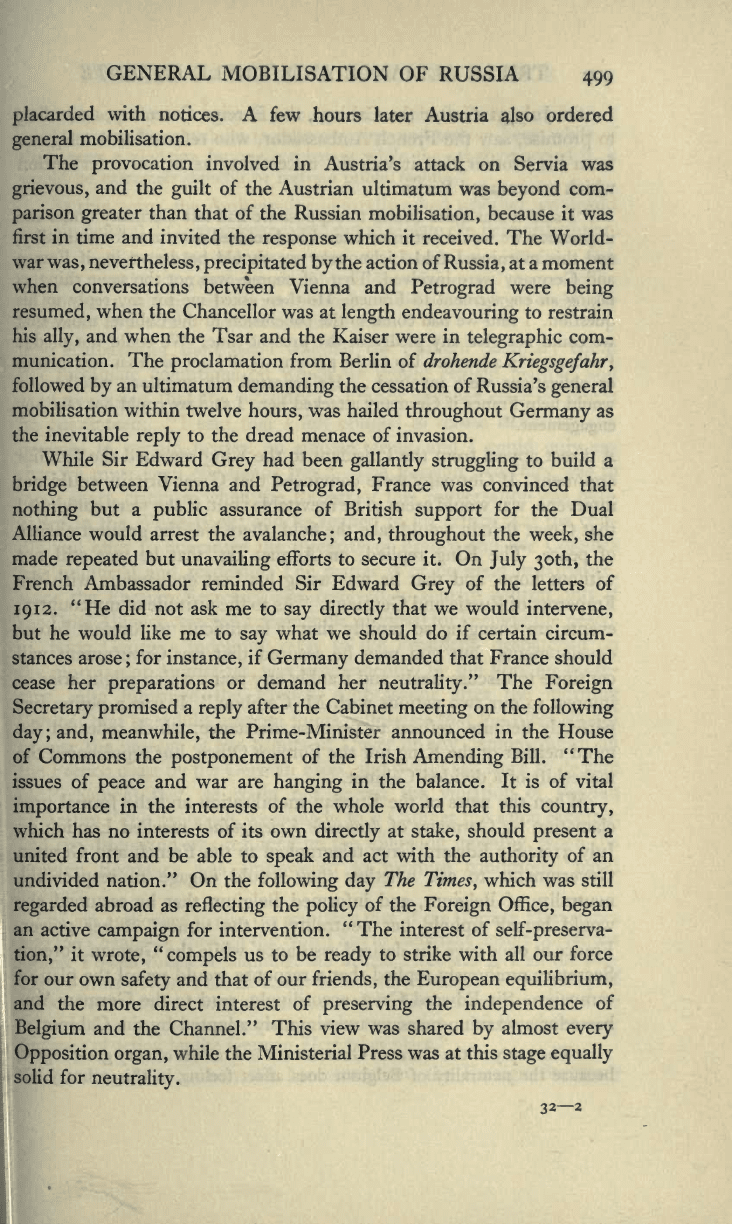
GENERAL
MOBILISATION OF RUSSIA
499
placarded
with
notices. A
few hours
later Austria
also
ordered
general
mobilisation.
The
provocation
involved
in
Austria's attack
on
Servia
was
grievous,
and
the
guilt
of
the
Austrian
ultimatum was
beyond
com-
parison greater
than
that
of
the Russian
mobilisation,
because
it
was
first
in
time and
invited the
response
which
it received. The World-
war
was,
nevertheless,
precipitated
by
the action
of
Russia,
at
a
moment
when
conversations
between Vienna and
Petrograd
were
being
resumed,
when
the
Chancellor was
at
length endeavouring
to restrain
his
ally,
and
when
the Tsar and
the Kaiser
were
in
telegraphic
com-
munication. The
proclamation
from
Berlin of
drohende
Kriegsgefahr
',
followed
by
an
ultimatum
demanding
the cessation of Russia's
general
mobilisation
within
twelve
hours,
was hailed
throughout Germany
as
the inevitable
reply
to
the dread menace
of
invasion.
While
Sir
Edward
Grey
had been
gallantly
struggling
to
build
a
bridge
between Vienna
and
Petrograd,
France was
convinced
that
nothing
but
a
public
assurance of British
support
for
the
Dual
Alliance would
arrest the
avalanche;
and,
throughout
the
week,
she
made
repeated
but
unavailing
efforts to secure
it.
On
July
30th,
the
French
Ambassador reminded
Sir Edward
Grey
of
the letters
of
1912.
"He did
not
ask
me to
say
directly
that
we would
intervene,
but he
would
like me to
say
what we
should do if
certain circum-
stances
arose;
for
instance,
if
Germany
demanded
that France
should
cease her
preparations
or demand her
neutrality."
The
Foreign
Secretary
promised
a
reply
after
the Cabinet
meeting
on the
following
day;
and,
meanwhile,
the
Prime-Minister announced
in
the House
of Commons
the
postponement
of
the
Irish
Amending
Bill.
"The
issues of
peace
and war are
hanging
in
the balance.
It
is
of
vital
importance
in
the interests
of
the
whole world
that this
country,
which has no
interests
of
its
own
directly
at
stake,
should
present
a
united front and
be
able
to
speak
and
act with the
authority
of an
undivided
nation."
On
the
following day
The
Times,
which was still
regarded
abroad
as
reflecting
the
policy
of
the
Foreign
Office,
began
an
active
campaign
for
intervention.
"The interest
of
self-preserva-
tion,"
it
wrote,
"compels
us
to
be
ready
to
strike with
all our
force
for our
own
safety
and
that
of our
friends,
the
European equilibrium,
and
the
more
direct interest
of
preserving
the
independence
of
Belgium
and
the Channel."
This
view was shared
by
almost
every
Opposition
organ,
while the
Ministerial
Press was at
this
stage
equally
solid for
neutrality.
32
—
2
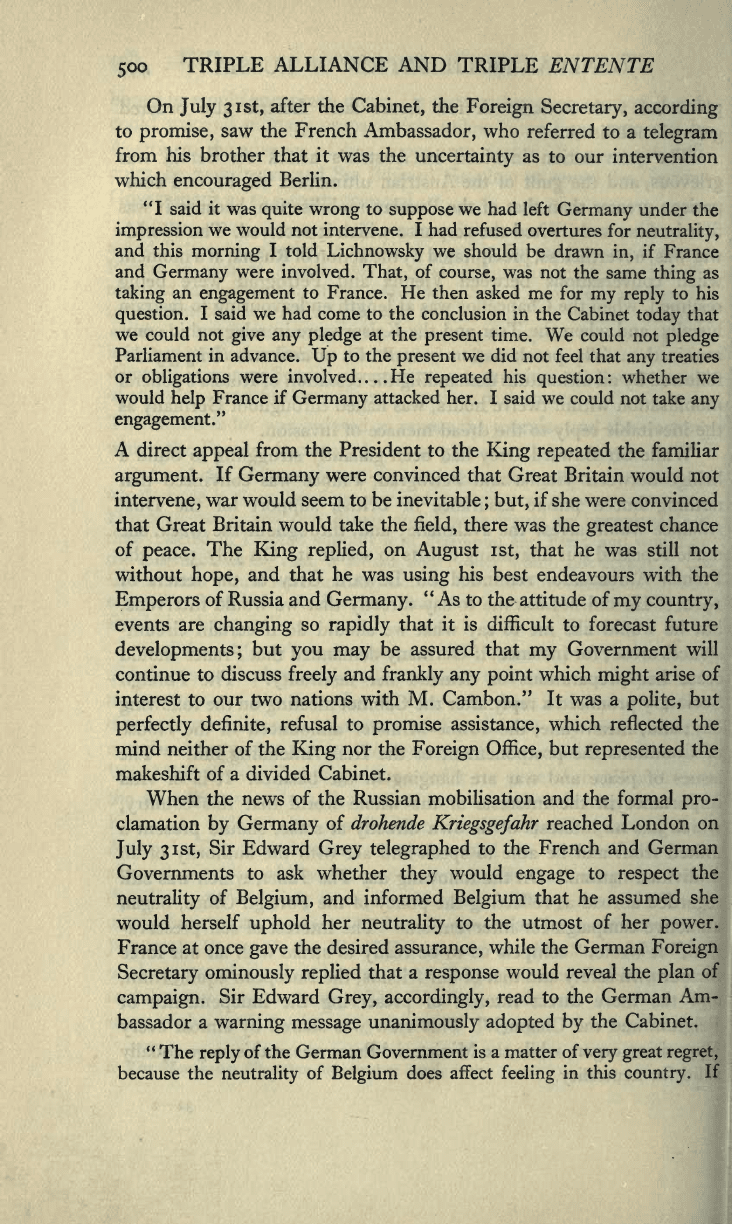
5
oo
TRIPLE
ALLIANCE
AND
TRIPLE ENTENTE
On
July
31st,
after
the
Cabinet,
the
Foreign
Secretary,
according
to
promise,
saw
the French
Ambassador,
who
referred to
a
telegram
from his
brother
that
it was the
uncertainty
as
to
our intervention
which
encouraged
Berlin.
"I said it was
quite
wrong
to
suppose
we
had
left
Germany
under the
impression
we would not
intervene.
I had
refused
overtures for
neutrality,
and
this
morning
I told
Lichnowsky
we should be
drawn
in,
if
France
and
Germany
were
involved.
That,
of
course,
was not
the
same
thing
as
taking
an
engagement
to France.
He then asked
me for
my reply
to his
question.
I said we
had
come to the
conclusion in
the Cabinet
today
that
we could not
give any pledge
at the
present
time. We could not
pledge
Parliament in
advance.
Up
to
the
present
we
did
not feel that
any
treaties
or
obligations
were
involved He
repeated
his
question:
whether we
would
help
France
if
Germany
attacked
her.
I
said
we could not
take
any
engagement.'
*
A
direct
appeal
from
the President to the
King repeated
the
familiar
argument.
If
Germany
were convinced
that
Great Britain would not
intervene,
war
would
seem to
be
inevitable
; but,
if
she were convinced
that Great Britain
would take the
field,
there
was
the
greatest
chance
of
peace.
The
King
replied,
on
August
1st,
that
he
was still not
without
hope,
and
that
he was
using
his
best endeavours with the
Emperors
of
Russia and
Germany.
"
As to the
attitude
of
my
country,
events
are
changing
so
rapidly
that
it is difficult
to forecast
future
developments;
but
you may
be
assured
that
my
Government
will
continue to discuss
freely
and
frankly any point
which
might
arise
of
interest to
our two nations with M.
Cambon."
It
was a
polite,
but
perfectly
definite,
refusal to
promise
assistance,
which
reflected
the
mind neither of the
King
nor the
Foreign
Office,
but
represented
the
makeshift
of a divided Cabinet.
When the news
of the Russian mobilisation and the formal
pro-
clamation
by Germany
of drohende
Kriegsgefahr
reached London
on
July 31st,
Sir
Edward
Grey telegraphed
to the French
and
German
Governments to ask whether
they
would
engage
to
respect
the
neutrality
of
Belgium,
and informed
Belgium
that
he assumed
she
would
herself
uphold
her
neutrality
to the utmost
of her
power.
France at once
gave
the desired
assurance,
while the
German
Foreign
Secretary
ominously replied
that a
response
would reveal
the
plan
of
campaign.
Sir
Edward
Grey,
accordingly,
read to
the German
Am-
bassador a
warning message
unanimously adopted by
the Cabinet.
"
The
reply
of the German Government
is a matter
of
very
great
regret,
because the
neutrality
of
Belgium
does
affect
feeling
in
this
country.
If
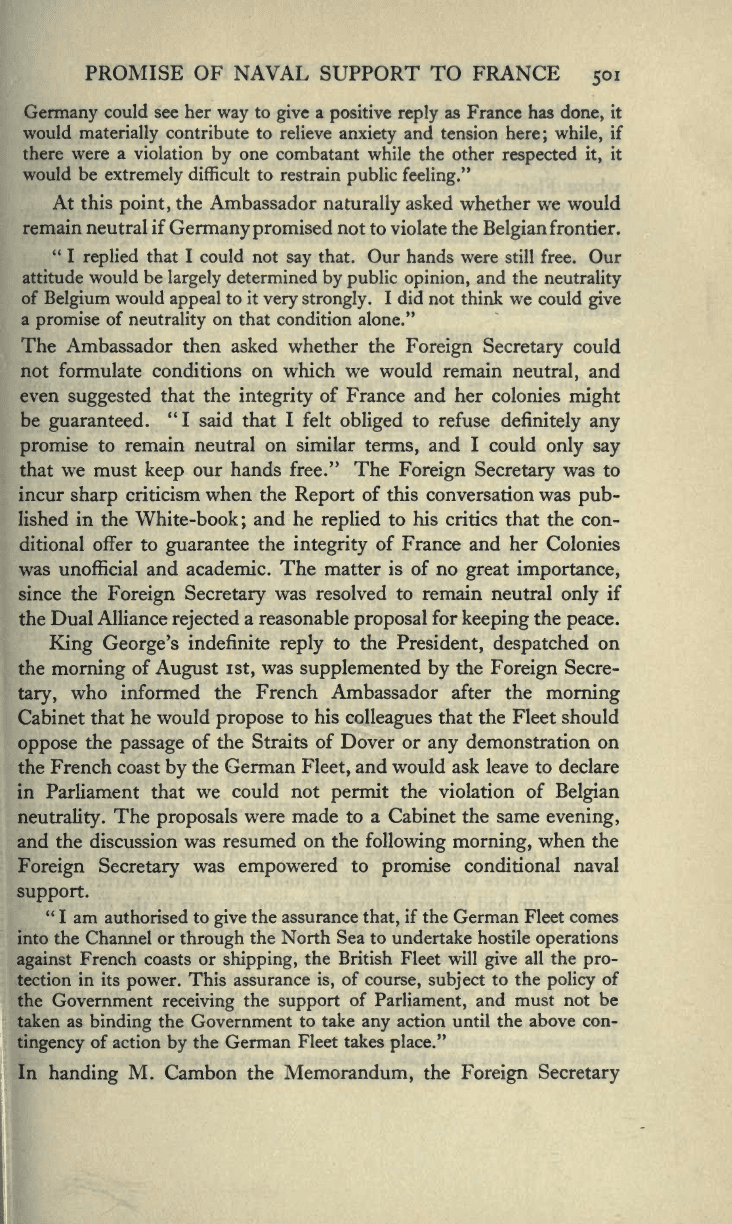
PROMISE OF NAVAL
SUPPORT
TO
FRANCE
501
Germany
could see her
way
to
give
a
positive
reply
as France has
done,
it
would
materially
contribute to
relieve
anxiety
and
tension
here;
while,
if
there were
a
violation
by
one
combatant while the other
respected
it,
it
would be
extremely
difficult to
restrain
public feeling."
At
this
point,
the
Ambassador
naturally
asked
whether we would
remain
neutral
if
Germanypromised
not to
violate
the
Belgian
frontier.
"
I
replied
that I could
not
say
that. Our hands
were still
free.
Our
attitude
would
be
largely
determined
by public opinion,
and
the
neutrality
of
Belgium
would
appeal
to it
very
strongly.
I did
not
think
we could
give
a
promise
of
neutrality
on
that
condition
alone."
The Ambassador
then asked whether
the
Foreign
Secretary
could
not formulate
conditions on which we
would remain
neutral,
and
even
suggested
that
the
integrity
of France and
her colonies
might
be
guaranteed.
"I
said
that
I
felt
obliged
to refuse
definitely
any
promise
to
remain neutral
on
similar
terms,
and
I
could
only say
that
we
must
keep
our hands free." The
Foreign Secretary
was
to
incur
sharp
criticism
when the
Report
of
this
conversation
was
pub-
lished in
the
White-book;
and he
replied
to
his critics
that the
con-
ditional offer to
guarantee
the
integrity
of
France and her
Colonies
was unofficial
and academic. The
matter
is
of no
great
importance,
since
the
Foreign
Secretary
was resolved to remain
neutral
only
if
the
Dual Alliance
rejected
a reasonable
proposal
for
keeping
the
peace.
King
George's
indefinite
reply
to
the
President,
despatched
on
the
morning
of
August
1st,
was
supplemented
by
the
Foreign
Secre-
tary,
who informed the
French
Ambassador
after the
morning
Cabinet that
he would
propose
to
his
colleagues
that
the
Fleet should
oppose
the
passage
of
the
Straits
of
Dover
or
any
demonstration on
the French
coast
by
the
German
Fleet,
and would ask leave to declare
in
Parliament that
we could not
permit
the violation
of
Belgian
neutrality.
The
proposals
were
made to a Cabinet
the
same
evening,
and the discussion was
resumed
on
the
following
morning,
when the
Foreign Secretary
was
empowered
to
promise
conditional
naval
support.
"lam
authorised
to
give
the assurance
that,
if
the
German
Fleet comes
into
the Channel or
through
the
North Sea to
undertake
hostile
operations
against
French coasts or
shipping,
the
British
Fleet
will
give
all the
pro-
tection in its
power.
This assurance
is,
of
course,
subject
to
the
policy
of
the
Government
receiving
the
support
of
Parliament,
and
must not be
taken as
binding
the Government
to
take
any
action until
the above con-
tingency
of action
by
the
German
Fleet
takes
place."
In
handing
M.
Cambon
the
Memorandum,
the
Foreign
Secretary
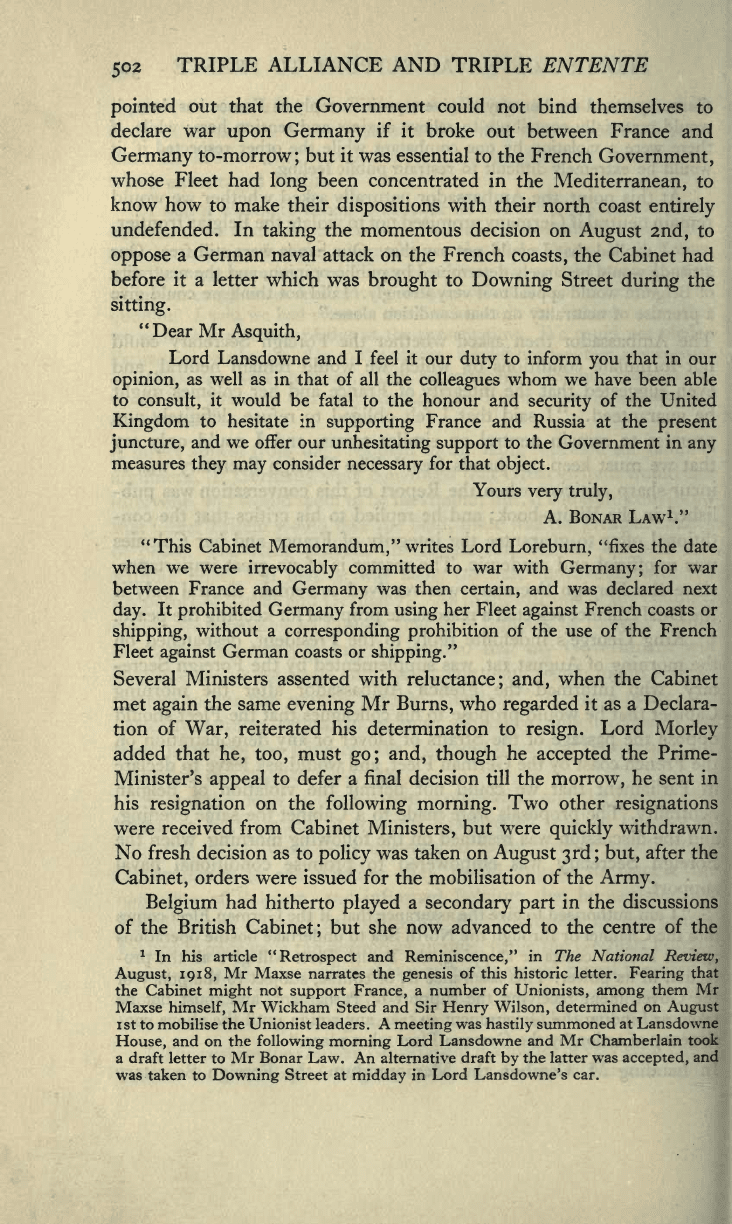
5
02
TRIPLE
ALLIANCE AND
TRIPLE ENTENTE
pointed
out
that the Government could
not
bind
themselves
to
declare
war
upon
Germany
if
it broke
out between
France
and
Germany
to-morrow;
but
it was
essential to
the French
Government,
whose
Fleet
had
long
been
concentrated
in
the
Mediterranean,
to
know
how
to make their
dispositions
with their
north
coast
entirely
undefended. In
taking
the
momentous decision on
August
2nd,
to
oppose
a
German naval
attack
on
the French
coasts,
the
Cabinet
had
before
it
a
letter which was
brought
to
Downing
Street
during
the
sitting.
'
'Dear
Mr
Asquith,
Lord
Lansdowne and
I
feel
it our
duty
to inform
you
that in our
opinion,
as
well
as in
that
of
all the
colleagues
whom
we have been able
to
consult,
it
would
be fatal to
the
honour and
security
of
the United
Kingdom
to
hesitate
in
supporting
France
and
Russia at the
present
juncture,
and
we offer our
unhesitating support
to
the Government
in
any
measures
they may
consider
necessary
for
that
object.
Yours
very
truly,
A.
Bonar Law
1
."
"This Cabinet
Memorandum,"
writes Lord
Loreburn,
"fixes the date
when we were
irrevocably
committed to war with
Germany;
for war
between
France
and
Germany
was then
certain,
and was
declared
next
day.
It
prohibited Germany
from
using
her
Fleet
against
French coasts
or
shipping,
without a
corresponding
prohibition
of the use of the French
Fleet
against
German coasts or
shipping."
Several Ministers assented with
reluctance; and,
when
the
Cabinet
met
again
the
same
evening
Mr
Burns,
who
regarded
it
as a
Declara-
tion
of
War,
reiterated
his
determination to
resign.
Lord
Morley
added that
he, too,
must
go;
and,
though
he
accepted
the
Prime-
Minister's
appeal
to
defer a final decision
till
the
morrow,
he sent
in
his
resignation
on
the
following
morning.
Two other
resignations
were
received
from
Cabinet
Ministers,
but were
quickly
withdrawn.
No fresh decision as
to
policy
was taken
on
August
3rd
;
but,
after the
Cabinet,
orders
were issued
for
the
mobilisation
of
the
Army.
Belgium
had
hitherto
played
a
secondary
part
in
the
discussions
of the British
Cabinet;
but
she now
advanced
to
the centre
of
the
1
In his article
"Retrospect
and
Reminiscence,"
in The National
Review,
August, 1918,
Mr
Maxse
narrates the
genesis
of this historic letter.
Fearing
that
the
Cabinet
might
not
support
France,
a
number
of
Unionists, among
them
Mr
Maxse
himself,
Mr Wickham
Steed and
Sir
Henry
Wilson,
determined
on
August
1
st
to
mobilise the
Unionist
leaders.
A
meeting
was
hastily
summoned
at
Lansdowne
House,
and on the
following morning
Lord
Lansdowne
and Mr Chamberlain
took
a
draft letter
to
Mr Bonar
Law. An alternative
draft
by
the latter
was
accepted,
and
was
taken
to
Downing
Street at
midday
in Lord Lansdowne's car.
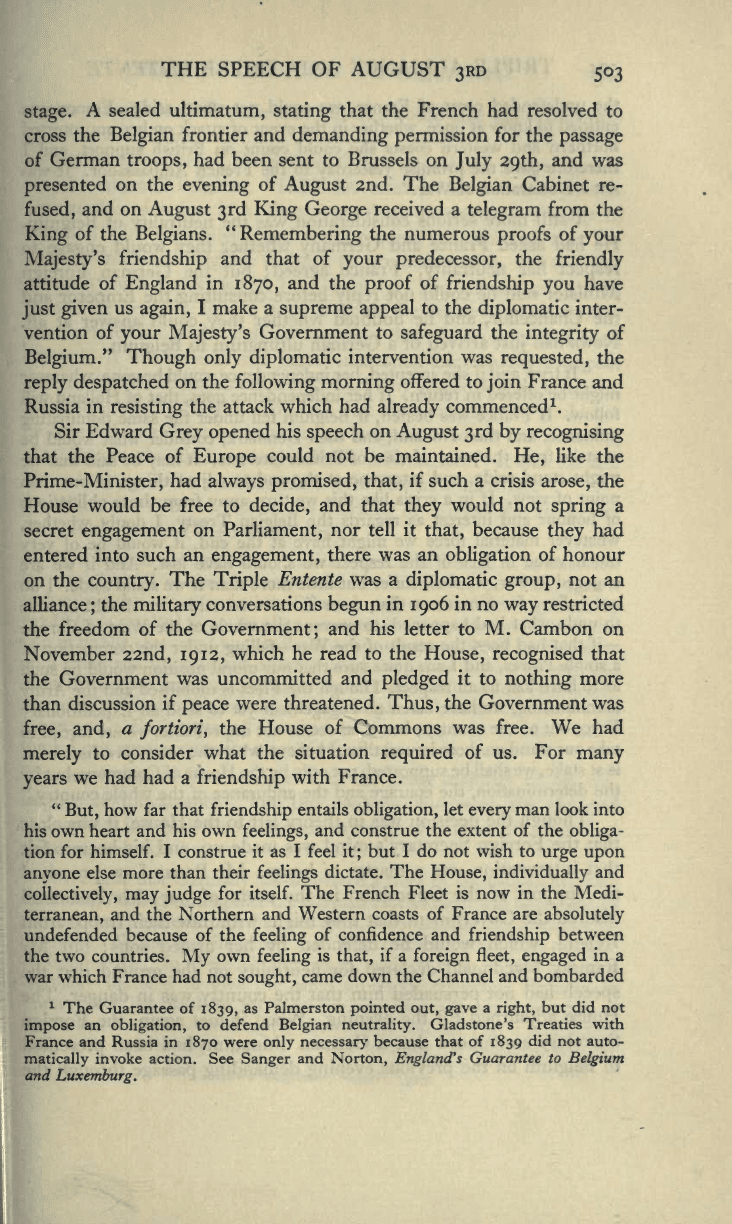
THE SPEECH OF
AUGUST
3
rd
503
stage.
A sealed
ultimatum,
stating
that the French
had
resolved
to
cross
the
Belgian
frontier and
demanding
permission
for the
passage
of
German
troops,
had
been sent to Brussels on
July 29th,
and was
presented
on the
evening
of
August
2nd.
The
Belgian
Cabinet re-
fused,
and
on
August
3rd King
George
received a
telegram
from
the
King
of
the
Belgians.
"
Remembering
the numerous
proofs
of
your
Majesty's
friendship
and
that
of
your
predecessor,
the
friendly
attitude
of
England
in
1870,
and
the
proof
of
friendship
you
have
just
given
us
again,
I
make
a
supreme appeal
to the
diplomatic
inter-
vention
of
your
Majesty's
Government
to
safeguard
the
integrity
of
Belgium." Though
only diplomatic
intervention was
requested,
the
reply despatched
on
the
following morning
offered to
join
France and
Russia
in
resisting
the attack
which
had
already
commenced
1
.
Sir
Edward
Grey opened
his
speech
on
August 3rd by
recognising
that
the Peace
of
Europe
could
not be maintained.
He,
like
the
Prime-Minister,
had
always
promised,
that,
if
such
a
crisis
arose,
the
House
would be free to
decide,
and
that
they
would
not
spring
a
secret
engagement
on
Parliament,
nor tell
it
that,
because
they
had
entered
into
such
an
engagement,
there
was an
obligation
of
honour
on
the
country.
The
Triple
Entente was a
diplomatic
group,
not
an
alliance
;
the
military
conversations
begun
in
1906
in
no
way
restricted
the
freedom
of
the
Government;
and his
letter to
M.
Cambon on
November
22nd,
19
12,
which he read to the
House,
recognised
that
the Government
was uncommitted
and
pledged
it
to
nothing
more
than
discussion
if
peace
were threatened.
Thus,
the
Government
was
free, and,
a
fortiori
',
the House
of
Commons was
free. We
had
merely
to
consider
what
the situation
required
of us. For
many
years
we
had had
a
friendship
with
France.
"
But,
how far that
friendship
entails
obligation,
let
every
man look
into
his
own
heart
and his own
feelings,
and
construe the extent
of
the
obliga-
tion for
himself.
I
construe
it
as I feel it
;
but I
do
not wish to
urge upon
anyone
else more
than their
feelings
dictate.
The
House,
individually
and
collectively,
may
judge
for itself. The
French
Fleet is
now in the Medi-
terranean,
and
the
Northern
and Western coasts
of
France
are
absolutely
undefended because of the
feeling
of confidence and
friendship
between
the two countries.
My
own
feeling
is
that,
if a
foreign
fleet,
engaged
in a
war which
France
had
not
sought,
came down the Channel
and bombarded
1
The Guarantee of
1839,
as
Palmerston
pointed
out,
gave
a
right,
but
did
not
impose
an
obligation,
to defend
Belgian
neutrality.
Gladstone's
Treaties with
France and
Russia in
1870
were
only
necessary
because that
of
1839
did not auto-
matically
invoke
action.
See
Sanger
and
Norton, England's
Guarantee to
Belgium
id
Luxemburg.
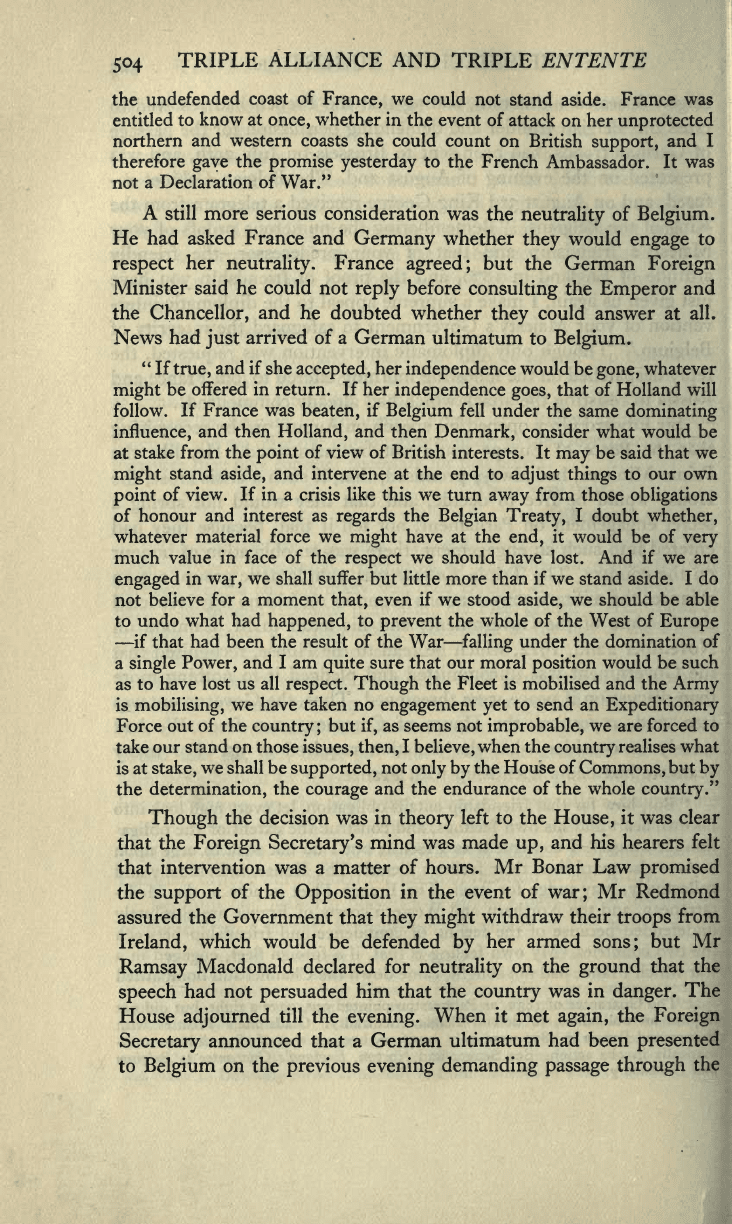
5
o
4
TRIPLE
ALLIANCE AND
TRIPLE ENTENTE
the
undefended
coast
of
France,
we
could
not
stand aside.
France
was
entitled
to
know at
once,
whether in the
event of
attack
on
her
unprotected
northern
and western coasts she
could count
on
British
support,
and
I
therefore
gave
the
promise
yesterday
to the
French
Ambassador.
It
was
not
a
Declaration
of
War."
A
still
more serious
consideration
was
the
neutrality
of
Belgium.
He
had asked France and
Germany
whether
they
would
engage
to
respect
her
neutrality.
France
agreed;
but the German
Foreign
Minister said he could
not
reply
before
consulting
the
Emperor
and
the
Chancellor,
and he
doubted whether
they
could
answer at
all.
News
had
just
arrived of a
German
ultimatum
to
Belgium.
"
If
true,
and
if
she
accepted,
her
independence
would
be
gone,
whatever
might
be offered
in
return.
If
her
independence
goes,
that
of Holland will
follow.
If France
was
beaten,
if
Belgium
fell under the same
dominating
influence,
and then
Holland,
and
then
Denmark,
consider
what would be
at stake
from the
point
of view of
British
interests.
It
may
be said that we
might
stand
aside,
and
intervene at the end to
adjust things
to our
own
point
of
view.
If in a crisis like
this we turn
away
from those
obligations
of
honour and interest as
regards
the
Belgian Treaty,
I
doubt
whether,
whatever
material force we
might
have
at
the
end,
it would be of
very
much value
in face
of
the
respect
we
should have
lost.
And if
we
are
engaged
in
war,
we shall suffer but little more than if we stand
aside.
I do
not
believe
for a moment
that,
even
if
we stood
aside,
we
should be able
to undo
what had
happened,
to
prevent
the whole
of
the West of
Europe
—
if
that
had
been the
result of
the War
—
falling
under the domination
of
a
single
Power,
and
I am
quite
sure
that our moral
position
would be such
as
to have
lost us all
respect.
Though
the Fleet is mobilised and the
Army
is
mobilising,
we have taken no
engagement
yet
to send
an
Expeditionary
Force
out
of the
country
;
but
if,
as seems not
improbable,
we are forced
to
take
our stand
on
those
issues,
then,
I
believe,
when the
country
realises
what
is
at
stake,
we shall
be
supported,
not
only by
the
House
of
Commons,
but
by
the
determination,
the
courage
and
the
endurance
of
the whole
country."
Though
the
decision
was
in
theory
left
to
the
House,
it
was clear
that
the
Foreign
Secretary's
mind was made
up,
and his hearers felt
that
intervention
was
a matter
of hours.
Mr Bonar Law
promised
the
support
of
the
Opposition
in
the event
of
war;
Mr Redmond
assured the
Government
that
they might
withdraw
their
troops
from
Ireland,
which would
be
defended
by
her
armed
sons;
but Mr
Ramsay
Macdonald declared
for
neutrality
on
the
ground
that
the
speech
had not
persuaded
him
that the
country
was in
danger.
The
House
adjourned
till
the
evening.
When it
met
again,
the
Foreign
Secretary
announced
that
a German
ultimatum
had been
presented
to
Belgium
on
the
previous evening
demanding
passage
through
the
